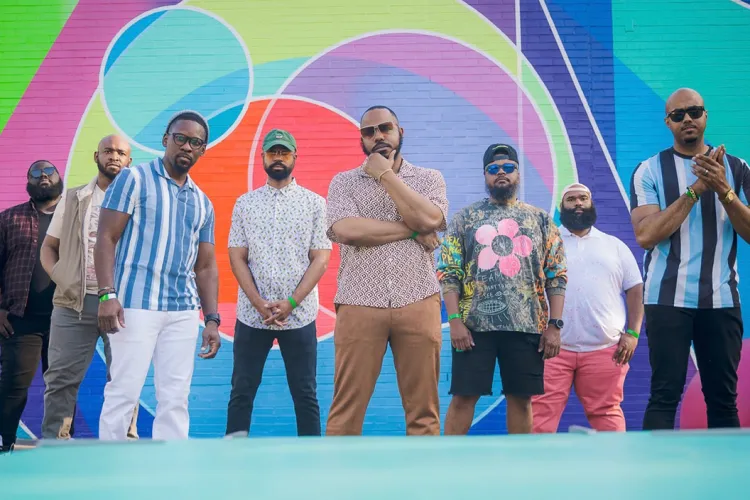More than a Marching Band: DuPont Brass Band Visits Swarthmore

DuPont Brass Band takes its name from Washington D.C.'s Dupont Circle Metro Station, where members started out busking.
DuPont Brass is a one-of-a-kind, brass-driven supergroup hailing from the vibrant DMV (D.C./Maryland/Virginia) area. Born out of the musical halls of Howard University, what was once a quintet of music scholars has blossomed into a dynamic ten-piece force, featuring brass, a rhythm section, and vocal prowess. Their journey began with humble origins, as they busked in Metro stations to fund their education, but has since catapulted them onto prestigious stages across the nation.
The Department of Music will welcome DuPont Brass to Swarthmore the first week of the Fall 2024 semester. The event is the first in the Cooper Series, a yearlong program that features artistic events including concerts, lectures, art exhibitions, and a symposium.
DuPont Brass' visit will include:
- a guest lecture in Assistant Professor of Music Tracey Stewart’s course More Than A Drumline: Exploring the Legacies of HBCU Marching Band Traditions, Thursday, Sept. 5 at 2:40 p.m. in Underhill Music Library’s Seminar Room;
- a community meet-and-greet to be held at the Black Cultural Center Thursday, Sept. 5 at 6 p.m.;
- an open-door concert in the Lang Performing Arts Center Friday, Sept. 6 at 6 p.m.
Stewart says her class, More Than A Drumline, examines the social, cultural, and historical significance of HBCU marching bands, connecting their histories to Black musicians and band music as far back as the Civil War. The course is motivated by her own experience as a trumpet player in Howard’s marching band when she was a student there. DuPont Brass is a perfect example of the lasting influence that HBCU marching bands have on the personal and professional lives of their members, says Stewart, many of whom go on to become music educators at all levels.
“I have friends who were in the band with me, who went on to graduate studies, then went back to their public schools to teach,” says Stewart. “And they've got students that went to HBCU because of them, because of their presence in that school.”
Marching bands are also important for the social networks they form, says Stewart.
“I had guest visits last fall for this course, and I had two people who were at Howard when I was there,” she says. “They met each other at Howard in the band, married, went on to have kids. Those kids went to Howard, went into the band, actually one of them met their spouse in the marching band. And I met their newborn infant at a Howard marching band event back in the spring.”
DuPont Brass Band takes its name from DuPont Circle Metro Station, where members started out busking.
“They were doing it for tuition, for food or whatever, but it didn't end there,” says Stewart. “They developed friendships and professional relationships that allowed them to turn DuPont Brass into what it is now. They tour, they're a business. They're more than they saw themselves being in that moment at that Metro station playing for passersby.”
Stewart invited DuPont to Swarthmore because they are artists and educators, and their career trajectories illustrate the many places that HBCU marching band experience can lead to:
“To institutions of higher education, to the public schools that we came from to give back, to Swarthmore College to show people, this is where we come from. This is what we do. And this is who we are.”
Stewart speaks from personal experience on the opportunities HBCU marching bands create for Black musicians.
“I was very blessed to march in Barack Obama's first inaugural parade,” she says, adding, “Our vice president [Kamala Harris], a Howard alumna, was escorted into the White House after the inauguration by members of the Howard University Showtime Marching Band.”



